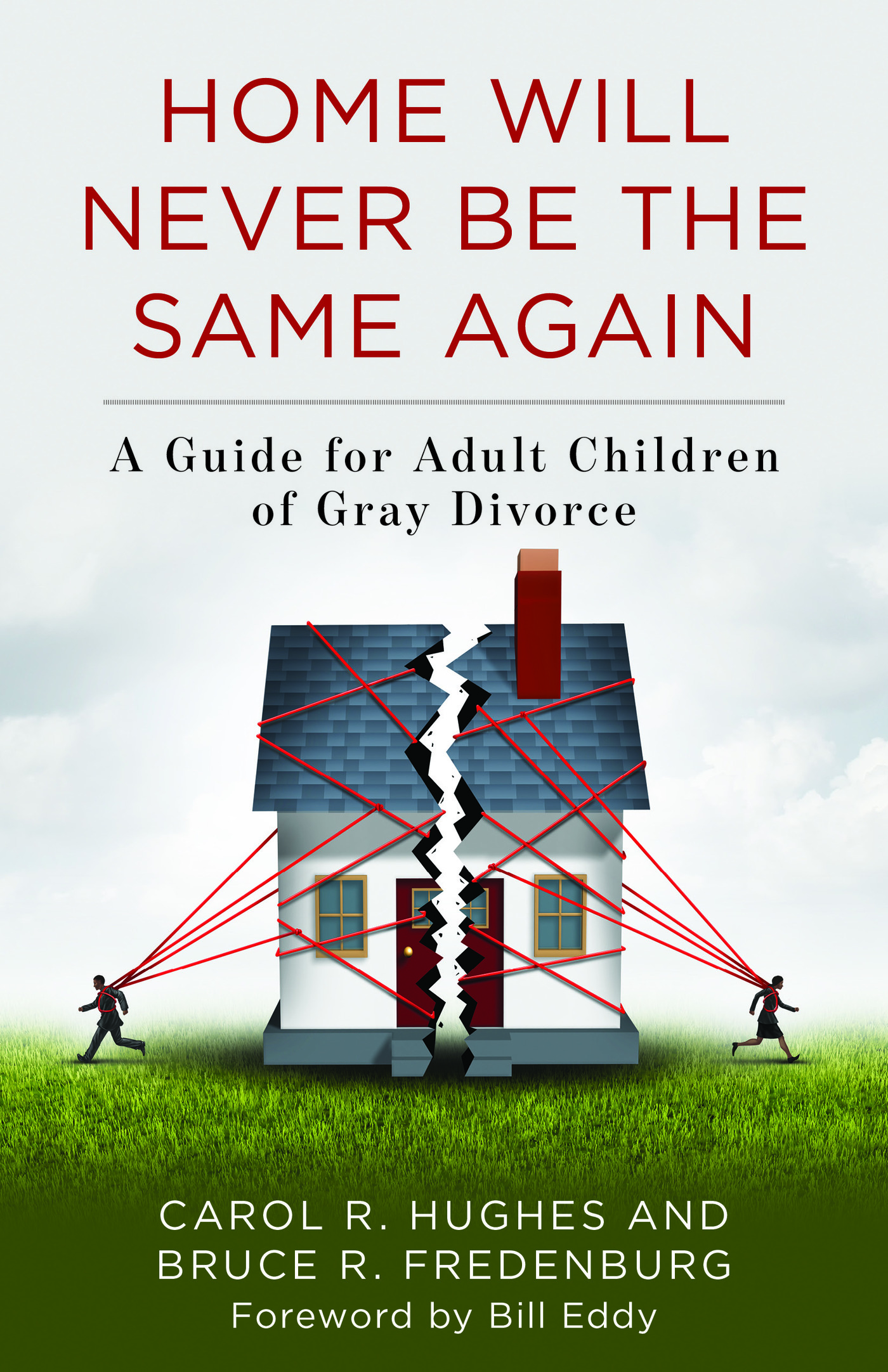Home Will Never Be
the Same Again
Home Will Never Be
the Same Again
A Guide for Adult Children
of Gray Divorce
Carol R. Hughes
and
Bruce R. Fredenburg
Foreword by Bill Eddy
ROWMAN & LITTLEFIELD
Lanham Boulder New York London
Published by Rowman & Littlefield
An imprint of The Rowman & Littlefield Publishing Group, Inc.
4501 Forbes Boulevard, Suite 200, Lanham, Maryland 20706
www.rowman.com
6 Tinworth Street, London SE11 5AL
Copyright 2020 by The Rowman & Littlefield Publishing Group, Inc.
All rights reserved. No part of this book may be reproduced in any form or by any electronic or mechanical means, including information storage and retrieval systems, without written permission from the publisher, except by a reviewer who may quote passages in a review.
British Library Cataloguing in Publication Information Available
Library of Congress Cataloging-in-Publication Data
Library of Congress Control Number: 2020932503
ISBN: 978-1-5381-3530-3 (cloth : alk. paper)
ISBN: 978-1-5381-3531-0 (electronic)
 TM The paper used in this publication meets the minimum requirements of American National Standard for Information SciencesPermanence of Paper for Printed Library Materials, ANSI/NISO Z39.48-1992.
TM The paper used in this publication meets the minimum requirements of American National Standard for Information SciencesPermanence of Paper for Printed Library Materials, ANSI/NISO Z39.48-1992.
Dedication
We dedicate this book to Stu Webb, who began a peacemaking movement thirty years ago that has been changing the way families throughout the world experience divorce.
Acknowledgments
We are grateful to Kerry DAgostino, our literary agent at Curtis Brown, Ltd., who first approached Carol to write this book. She was deeply concerned about the lack of literature thoroughly exploring gray divorce and, especially, its effect on adult children. From the beginning, Kerry championed the need for this book. Along our three-and-a-half-year journey bringing this book to fruition, she consistently encouraged us with her insightful feedback on the manuscript and provided cogent edits during numerous revisions. Her determination to make this resource available to those in need led us to Executive Editor Suzanne Staszak-Silva and Rowman & Littlefield Publishers, whom we thank for their unwavering support and confidence in this project.
Carols beloved daughters Lara Hughes-Allen and Anja Hughes, from as far away as Siberia and Lake Tahoe, respectively, have served as part-time research assistants, proofreaders, editors, technical-support gurus, and manuscript preparers. Anja recreated the graph in the introduction and illustrated the Losses from Divorce in chapter 4. Without their assistance, this book would be only an idea.
We also acknowledge our professional colleagues in the International Academy of Collaborative Professionals, and Collaborative Practice California, who are pioneers of respectful, family-focused approaches for helping divorcing couples. We have benefited immensely from their teaching. We want to thank the many members of our local practice group for embracing our lead in listening to the voices of Adult Children of parental divorce.
Over the past seventeen years, our education and training in respectful divorce solutions came from members of these groups. We are especially grateful to our colleagues from the Leadership Team of the Collaborative Divorce Education Institute, Cathleen Collinsworth, Bart Carey, and Brian Levy, who have donated thousands of hours in meetings and training to help advance the peacemaking skills of divorce professionals. Thank you to Woody Mosten, who continually said, You should write a book about that, and to Gary Friedman, who taught us understanding in conflict.
Beyond that, we are especially grateful to our respective spouses, Nick Allen and Yolanda Torres-Fredenburg, who continued to love and support us while tolerating our lack of availability and single focus on this book for three years. They have patiently endured the disorder created in our homes as books, papers, sticky notes, and other reference materials piled up for ready access.
We want to acknowledge Carols therapy dog Molly, who senses when people are sad, tense, angry, or afraid, and calms them, offering her unconditional support. Bruce often borrows Molly and uses her extraordinary healing presence whenever a child or adult is especially distressed.
Lastly, we thank all of our clients who trusted us over the past thirty years, shared so much of their lives, and allowed us to participate in their healing journeys.
Foreword
When I started reading this book, I decided to take a look at my last twenty divorce-mediation cases. Lo and behold, seven of them included adult children (35 percent). I hadnt even realized it until this book focused my attention on this subject. Yet as I read further, I remembered many of the seemingly unique issues that these gray divorces raised.
What about the dependent adult child with special needs? What about the kids in college who were counting on now-uncertain financial support from their parents? What about the adult child still living at home whom one parent wanted to continue supporting and the other parent wanted to cut off? What about the case where the parents could barely communicate, so that their adult children had to attend the mediation sessions to help keep them calm (as they had done for years)? And there were cases in which the adult children felt pressured to take sides (some did and some didnt).
I realized that I had all of these cases but scattered throughout my caseload, so that I hadnt put together the trend that authors Carol Hughes and Bruce Fredenburg had recognized. And I hadnt really considered the depth of emotional dislocation that the other unseen adult children were going through when their parents divorced. This book has opened a new door of awareness even for me, after nearly forty years of handling thousands of divorces in and out of court.
From high-conflict divorces to amicable divorces to those in which the parents wont talk about it, the adult children are clearly suffering toooften alone and feeling that they have nowhere to turn. All the rules have suddenly changed, and roles are often reversed, as their parents need help instead of providing it.
As this book so well describes, adult children are not alone and are not crazy. Their situation is becoming more and more common every year. In reality, we arent alone and cant get by without support from others. Fortunately, Hughes and Fredenburg are two therapists who specialize in the needs of the adult children of divorce. They are showing the way in this book, which will educate many other divorce professionals and will especially help those adult children who find themselves in this confusing and upsetting situation.
I hope that you find this book as revealing and encouraging as I did. The stories will pull at your heartstrings, but the wealth of information provided will get you thinking. The future of families and individuals depends on us learning how to manage all of these new transitions for everyone involvedand we can.
Bill Eddy, LCSW, Esq., lead author of Splitting, author of Dont Alienate the Kids, and the training director of the High Conflict Institute
Introduction
For more than two decades, long before the idea for this book became a reality, a silent revolution has been occurring and creating a seismic shift in the American family and families in other countries. It has been unfolding without much comment, and its effects are being felt across three to four generations. It has grown so rapidly that sociologists have already coined a term for itthe gray divorce revolution. Couples who divorce later in life after the age of fifty are a part of this cultural phenomenon.
Next page
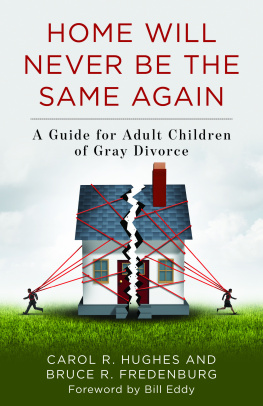


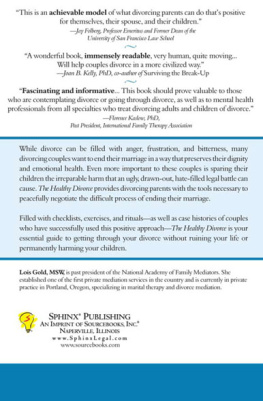
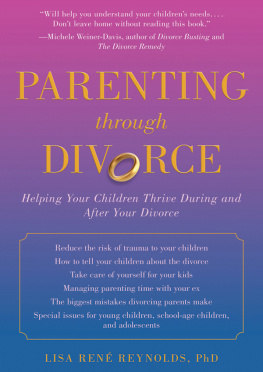
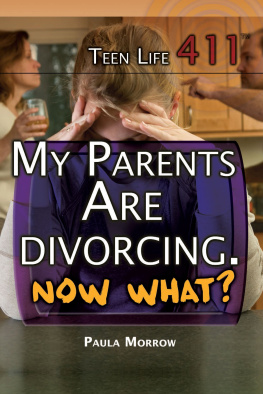
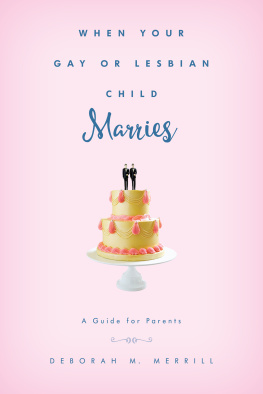

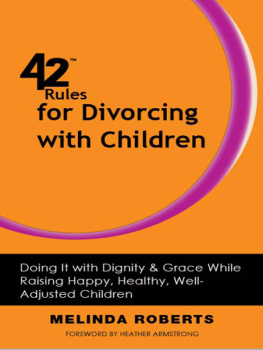
 TM The paper used in this publication meets the minimum requirements of American National Standard for Information SciencesPermanence of Paper for Printed Library Materials, ANSI/NISO Z39.48-1992.
TM The paper used in this publication meets the minimum requirements of American National Standard for Information SciencesPermanence of Paper for Printed Library Materials, ANSI/NISO Z39.48-1992.